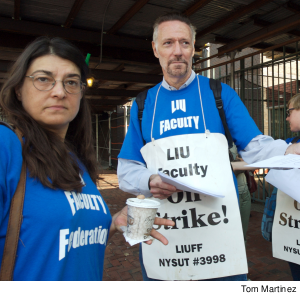Faculty at Long Island University’s Brooklyn campus ended a six-day strike after ratifying a new contract agreement on September 12. Wage increases are lower than in their previous contract, but more than management had offered before the job action. “It’s an imperfect victory,” said journalism professor and strike captain Ralph Engelman. A strike at LIU’s C.W. Post Campus on Long Island resulted in a similar agreement.
 |
Members of the Long Island University Faculty Federation (LIUFF) walked off the job at the Brooklyn campus after the administration refused to budge on proposed salary freezes and a plan to tie faculty pay to tuition revenue. Management’s proposal called for no wage increases in the first two years of the five-year contract, Engelman explained – and base pay increases in later years would have wholly or mainly depended on how much tuition money came in.
PROFIT SHARING?
“The faculty was very uncomfortable with this, a corporate model of profit-sharing,” Engelman told Clarion. The union attributed the overwhelming vote to strike to the administration’s hard-line stance over the summer, when it canceled negotiation sessions and threatened a lockout if the union didn’t acquiesce to its terms.
“They backed off on that, but that was the spirit and tone of the administration,” Engelman said. Strikers’ health care coverage was canceled when the strike began, another sign of management’s aggressive approach.
The walkout was highly effective, shutting down the vast majority of courses. Engelman said 95% of classes weren’t held.
The new contract provides no raise in the first year, followed by a 1% base pay increase in year two, a 1.5% increase in year three, and a 2% increase in the remaining two years of the five-year deal. In each of the last four years of the agreement, faculty could also receive lump-sum payments of between 0.5% and 2% of salary if tuition revenue rises by 3% or more.
Having any link between pay, even a lump-sum, and tuition revenue “was probably the most contentious issue among the faculty,” said Melissa Antinori, assistant director of the writing program in LIU’s English Department and a member of the LIUFF negotiating team. If this “contingent cash” in fact becomes available, the agreement gives faculty members the option to contribute it instead to a student scholarship fund. Some faculty strongly opposed to the pay-tuition link said they would do so.
The contract has some significant other gains – including the first-ever paid office hour for LIU’s adjunct faculty: one paid office hour for those who teach more than nine contact hours per semester. “The threshold’s a little high, but it’s a foot in the door,” said Antinori. “Hopefully we can bring it down in the future.” Management will also provide matching contributions for adjunct pensions, another first.
The union won a cap on non-tenure-track appointments, known at LIU as NTTA positions, which cannot exceed 15% of all full-time faculty lines. Full-time, non-tenure-track jobs are the fastest-growing category of academic employment in the US today. Antinori, who holds an NTTA post herself, says the limit is an important step for strengthening job security at LIU.
The agreement was ratified in a mass meeting by a vote of 142 to 41. The strike was the seventh in the history of the LIU union, which includes both part-time and full-time faculty. The strike at LIU’s C.W. Post Campus in Brookville was conducted by the C.W. Post Collegial Federation, which includes full-time faculty only. An agreement there with similar terms was ratified September 11, by a vote of 80 to 15. Adjuncts at C.W. Post are represented by CWA Local 1101, with a contract that does not expire until 2013.
Underlying the immediate issues in the LIU strikes is a broader conflict over university priorities. Faculty pay was 25% of the university budget 10 years ago but is 14% today, according to the LIUFF: “There’s been a great expansion of the administration bureaucracy,” Engelman said.
LACKLUSTER BOARD
Though LIU’s board is heavily weighted toward the corporate world, the union faults the university for lackluster private fundraising efforts. The faculty group notes that in the school’s 2011-2012 budget, less than 1% of revenue is projected to come from outside fundraising, compared to 91% from tuition.
PSC members showed up to support the strike at LIU. Members walked the picket lines with LIU strikers, and First VP Steve London spoke at a LIUFF rally. “This was a fight against austerity,” said Costas Panayotakis, associate professor of political science at the nearby campus of City Tech. “Many of the issues are similar to those we face at CUNY.”

